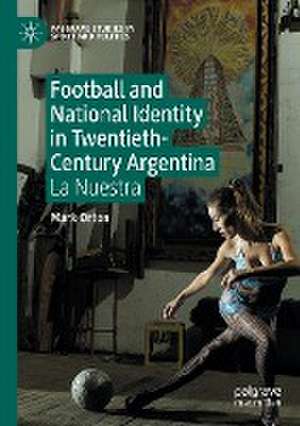Football and National Identity in Twentieth-Century Argentina: La Nuestra: Palgrave Studies in Sport and Politics
Autor Mark Ortonen Limba Engleză Paperback – 11 ian 2024
In this book, Mark Orton challenges existing myths surrounding the nativisation of football in Argentina away from British influence, as he shows how the game provided a conduit for the assimilation of millions of European immigrants in the early decades of the century into a new Argentine ‘race’. The book also examines how football gave some of the ‘voiceless others’ such as women, Afro-Argentines, indigenous people and those in the interior an arena to project themselves in an Argentine society that was masculine, white and Buenos Aires-dominated.
| Toate formatele și edițiile | Preț | Express |
|---|---|---|
| Paperback (1) | 781.31 lei 43-57 zile | |
| Springer International Publishing – 11 ian 2024 | 781.31 lei 43-57 zile | |
| Hardback (1) | 785.11 lei 43-57 zile | |
| Springer International Publishing – 10 ian 2023 | 785.11 lei 43-57 zile |
Preț: 781.31 lei
Preț vechi: 952.81 lei
-18% Nou
Puncte Express: 1172
Preț estimativ în valută:
149.51€ • 156.49$ • 124.43£
149.51€ • 156.49$ • 124.43£
Carte tipărită la comandă
Livrare economică 31 martie-14 aprilie
Preluare comenzi: 021 569.72.76
Specificații
ISBN-13: 9783031205910
ISBN-10: 303120591X
Pagini: 305
Ilustrații: XIII, 305 p. 3 illus., 2 illus. in color.
Dimensiuni: 148 x 210 mm
Greutate: 0.42 kg
Ediția:1st ed. 2023
Editura: Springer International Publishing
Colecția Palgrave Macmillan
Seria Palgrave Studies in Sport and Politics
Locul publicării:Cham, Switzerland
ISBN-10: 303120591X
Pagini: 305
Ilustrații: XIII, 305 p. 3 illus., 2 illus. in color.
Dimensiuni: 148 x 210 mm
Greutate: 0.42 kg
Ediția:1st ed. 2023
Editura: Springer International Publishing
Colecția Palgrave Macmillan
Seria Palgrave Studies in Sport and Politics
Locul publicării:Cham, Switzerland
Cuprins
Chapter 1: Introduction.- Chapter 2: ‘The Virile English Game’: The Origins of Argentine Football 1867–1912.- Chapter 3: Quién Somos? (Who are We?) 1913–1930.- Chapter 4: Argentinidad through the Looking Glass 1913-1930.- Chapter 5: Political Football: The Age of Decline? 1931-1958.- Chapter 6: The Age of Revolution 1959–1976.- Chapter 7: In the Shadow of the Proceso 1976–1983.- Chapter 8: False Dawn: From Democratic Restoration to Economic Armageddon 1983–2002.- Chapter 9: Conclusion.
Notă biografică
Mark A. Orton is an independent researcher with a PhD and MA in sports history from the International Centre for Sports History and Culture at De Montfort University in Leicester, UK. His research interests focus on national identity and sport in Spain and Latin America.
Textul de pe ultima copertă
This book examines how since its arrival in 1867 with British immigrants, football become the key cultural signifier of national identity in Argentina over the long twentieth century. With the international exploits of players such as Luis Monti, Alfredo Di Stéfano and Diego Maradona, the sport has projected Argentina onto the global consciousness not seen in any other way.
In this book, Mark Orton challenges existing myths surrounding the nativisation of football in Argentina away from British influence, as he shows how the game provided a conduit for the assimilation of millions of European immigrants in the early decades of the century into a new Argentine ‘race’. The book also examines how football gave some of the ‘voiceless others’ such as women, Afro-Argentines, indigenous people and those in the interior an arena to project themselves in an Argentine society that was masculine, white and Buenos Aires-dominated.
Mark A. Orton is an independent researcher witha PhD and MA in sports history from the International Centre for Sports History and Culture at De Montfort University in Leicester, UK. His research interests focus on national identity and sport in Spain and Latin America.
In this book, Mark Orton challenges existing myths surrounding the nativisation of football in Argentina away from British influence, as he shows how the game provided a conduit for the assimilation of millions of European immigrants in the early decades of the century into a new Argentine ‘race’. The book also examines how football gave some of the ‘voiceless others’ such as women, Afro-Argentines, indigenous people and those in the interior an arena to project themselves in an Argentine society that was masculine, white and Buenos Aires-dominated.
Mark A. Orton is an independent researcher witha PhD and MA in sports history from the International Centre for Sports History and Culture at De Montfort University in Leicester, UK. His research interests focus on national identity and sport in Spain and Latin America.
Caracteristici
Examines how football became the key cultural signifier of national identity in Argentina Shows how football projected Argentina onto the global consciousness not seen in any other way Discusses how football gave some ‘voiceless others’ an arena to project themselves in Argentine society











